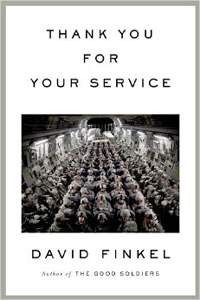Book Notes
 David Finkel, Thank You For Your Service (New York: Farrar, Straus, and Giroux, 2013), 256pp.
David Finkel, Thank You For Your Service (New York: Farrar, Straus, and Giroux, 2013), 256pp.
Two million American women and men fought in the wars in Afghanistan and Iraq. Most of these people return home to normal lives, but for many others, writes David Finkel, "the war endures" once they get back home. "Studies suggest that 20 to 30 percent have come home with post-traumatic stress disorder." This means that some 500,000 former soldiers back home struggle with "depression, anxiety, nightmares, memory problems, personality changes, and suicidal thoughts: every war has its after-war."
For his award-winning book The Good Soldiers (2009), Finkel was embedded in the 2nd Battalion, 16th Infantry Regiment during the "surge" of 2007 in Iraq. For this book he's once again embedded with the 2-16, only this time with the families of soldiers who are fighting PTSD after their deployments have ended. The book is almost pornographic in its vivid descriptions of psychic carnage, and what the violence and vulgarity of war do to normal human beings. It made me think of the aphorism of the Yale chaplain William Sloane Coffin, that in war, "for every boy turned into a man, there are five human beings turned into animals."
Adam speaks for many of them when he says, "I feel completely broken." Tausolo from American Samoa must collect thirty-nine signatures when he negotiates a VA program. Nic is in a psychiatric facility for "Cognitive Processing Therapy." In Washington, General Peter Chiarelli chairs a Senior Suicide Prevention Group. Patti is a Soldier Family Advocate. Fred has helped over a thousand soldiers in his Pathway Home. We meet not only these soldiers, but also their families, as they try to reconstruct some semblance of a normal life — wives, a widow, friends, family, military people, and competent and compassionate care givers.
These stories about the degradation and savagery of war belie the naive optimism about fairy-tale homecomings, and the jingoistic rhetoric that glorifies one of humanity's most powerful inhibitions — killing another human being. The soldiers are filled with shame and self-loathing at what they had done and become as human beings. Making things worse was the disconnect back home, where people thanked them for being heroes. At least in Finkel's hands they have a compassionate truth-teller who helps them tell their stories.


